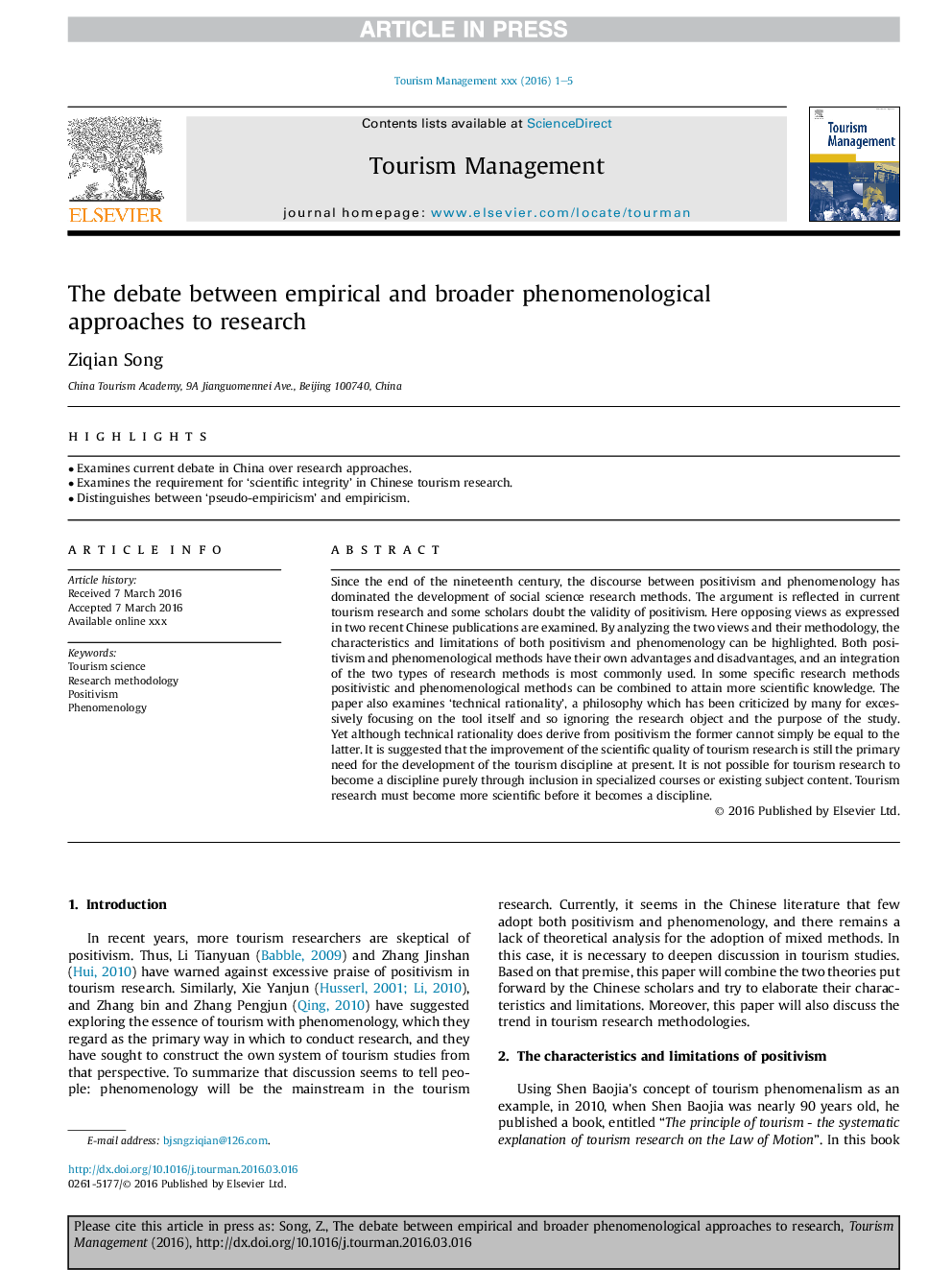| کد مقاله | کد نشریه | سال انتشار | مقاله انگلیسی | نسخه تمام متن |
|---|---|---|---|---|
| 5108736 | 1482625 | 2017 | 5 صفحه PDF | دانلود رایگان |
عنوان انگلیسی مقاله ISI
The debate between empirical and broader phenomenological approaches to research
ترجمه فارسی عنوان
بحث در مورد رویکردهای پدیده شناختی تجربی و گسترده به تحقیق
دانلود مقاله + سفارش ترجمه
دانلود مقاله ISI انگلیسی
رایگان برای ایرانیان
کلمات کلیدی
علم گردشگری، روش تحقیق، مثبت بودن، پدیده شناسی،
ترجمه چکیده
از اواخر قرن نوزدهم، گفتمان بین پوزیتیویسم و پدیده شناسی بر توسعه روش های تحقیق علوم اجتماعی غالب شده است. این استدلال در تحقیقات گردشگری فعلی منعکس شده است و برخی از محققان اعتبار پوزیتیویسم را تردید می کنند. در اینجا دیدگاه های متضادی که در دو نشریه اخیر چین بیان شده اند مورد بررسی قرار می گیرند. با تجزیه و تحلیل دو دیدگاه و روش آنها، ویژگی ها و محدودیت های هر دو پوزیتیویسم و پدیده شناسی را می توان برجسته کرد. هر دو روش مثبت گرایی و پدیدارشناسی دارای مزایا و معایب خاص خود هستند و اغلب استفاده از دو نوع روش تحقیق هماهنگ است. در بعضی از روش های تحقیقاتی خاص، می توان از روش های مثبت و پدیده شناختی برای دستیابی به دانش علمی بیشتر ترکیب کرد. این مقاله همچنین "عقلانیت فنی"، یک فلسفه را مورد بررسی قرار می دهد که توسط بسیاری از آنها مورد انتقاد قرار گرفته است و بیش از حد تمرکز خود را بر روی ابزار و به همین ترتیب نادیده گرفتن شیء تحقیق و هدف مطالعه. با این وجود، اگر چه عقلانیت فنی از مثبت گرایی حاصل می شود، نخست آن نمی تواند به سادگی برابر با دومی باشد. پیشنهاد شده است که بهبود کیفیت علمی تحقیقات گردشگری همچنان نیاز اصلی برای توسعه رشته های گردشگری در حال حاضر است. برای تحقیقات گردشگری ممکن است صرفا از طریق گنجاندن در دوره های تخصصی یا محتوای موضوع موجود تبدیل به یک نظم شود. تحقیقات گردشگری باید پیش از آنکه به رشته ای تبدیل شود، علمی تر شود.
موضوعات مرتبط
علوم انسانی و اجتماعی
مدیریت، کسب و کار و حسابداری
استراتژی و مدیریت استراتژیک
چکیده انگلیسی
Since the end of the nineteenth century, the discourse between positivism and phenomenology has dominated the development of social science research methods. The argument is reflected in current tourism research and some scholars doubt the validity of positivism. Here opposing views as expressed in two recent Chinese publications are examined. By analyzing the two views and their methodology, the characteristics and limitations of both positivism and phenomenology can be highlighted. Both positivism and phenomenological methods have their own advantages and disadvantages, and an integration of the two types of research methods is most commonly used. In some specific research methods positivistic and phenomenological methods can be combined to attain more scientific knowledge. The paper also examines 'technical rationality', a philosophy which has been criticized by many for excessively focusing on the tool itself and so ignoring the research object and the purpose of the study. Yet although technical rationality does derive from positivism the former cannot simply be equal to the latter. It is suggested that the improvement of the scientific quality of tourism research is still the primary need for the development of the tourism discipline at present. It is not possible for tourism research to become a discipline purely through inclusion in specialized courses or existing subject content. Tourism research must become more scientific before it becomes a discipline.
ناشر
Database: Elsevier - ScienceDirect (ساینس دایرکت)
Journal: Tourism Management - Volume 58, February 2017, Pages 307-311
Journal: Tourism Management - Volume 58, February 2017, Pages 307-311
نویسندگان
Ziqian Song,
